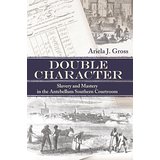There are many unusual angles to history. At certain key times, the weather, disease, or a simple personality quirk can make a profound difference in the outcomes of critical events. (Was Robert E. Lee having a heart attack during the Army of Virginia’s invasion of Maryland?) So it’s always fun to explore the niches and alternate scenarios.
I found an other niche recently — a book that explains how the law interacted with the culture of slavery in the pre-Civil War South. It’s titled Double Character: Slavery and Mastery in the Antebellum Southern Courtroom by Ariela J. Gross (University of Georgia Press, 2006). The institution of slavery required a necessary legal double standard, but frequently the slave culture and white culture came into conflict. Under the law, slaves were both people and property. But putting slaves on trial, or even calling them as witnesses, not only put black character on trial, but also questioned white character and the South’s sense of honor.
other niche recently — a book that explains how the law interacted with the culture of slavery in the pre-Civil War South. It’s titled Double Character: Slavery and Mastery in the Antebellum Southern Courtroom by Ariela J. Gross (University of Georgia Press, 2006). The institution of slavery required a necessary legal double standard, but frequently the slave culture and white culture came into conflict. Under the law, slaves were both people and property. But putting slaves on trial, or even calling them as witnesses, not only put black character on trial, but also questioned white character and the South’s sense of honor.
If you think the law is complicated today, slavery could really raise some interesting situations. If a plantation owner bought a slave who turned out to be sick or have a deficiency, was that the fault of the seller? Or was the slave simply faking? Who were the experts on slave maladies/faking? If the slave ran away, under what circumstances could a buyer get his money back? What were the legal ramifications of slave abuse? For example, a slave was rented out to another plantation, then was beaten to death. Was the original owner due any compensation? Under what circumstances could a slave testify, and who would believe them?
The book is an extensively referenced academic work with statistics, but was still an interesting read, especially for anyone who is a student of the law.
